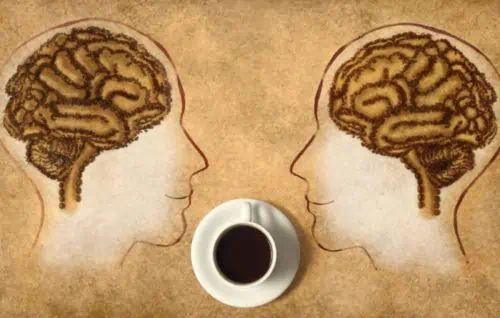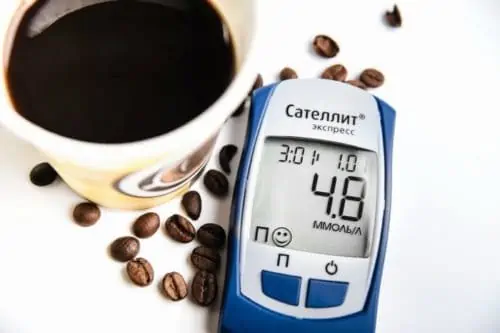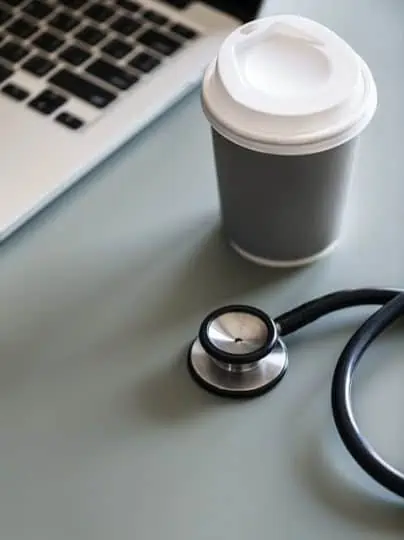Coffee is one of the most popular beverages in the world. Its great and refreshing taste has earned it countless fans.
But, it’s not just taste that makes your favorite brew awesome. Coffee contains a wealth of good qualities and amazing health benefits.
Here at artofbarista, we will talk about 25 Science-Backed Health Benefits Of Coffee That You May Not Know.
1. Stimulates The Brain And Makes You Smarter

A cup of coffee makes you feel refreshed. Well, that’s because the great-tasting drink isn’t just for your tastebuds, but also for your brain. When you drink coffee, the caffeine in it enters the bloodstream and heads for the brain.
The process is fairly quick – caffeine will enter your bloodstream in 15 minutes, and 99% of caffeine will be available within 45 minutes.
See also:
In the brain, caffeine blocks inhibitory neurotransmitters and encourages enhanced firing of neurons. This leads to effects like improved performance in terms of memory, vigilance, and general mental function.
Extended Reading:
Bioactive Molecules in Food. Reference Series in Phytochemistry. Springer, Cham | Springer | Nov 2017
Simply Thinking About Coffee Gives Your Brain A Boost, Study Suggests | Forbes | March 2019
2. Protects The Brain And Fights Alzheimer’s Disease

Coffee is the most commonly consumed psychoactive substance in the world. Coffee also has a neuroprotective side that can protect the brain from terrible illnesses like Alzheimer’s Disease and dementia.
In the USA alone, more than 5 million people suffer from Alzheimer’s Disease, and the number is expected to rise considerably in the coming years. Dementia has similarly frightening statistics.
It is now widely believed that consumption of coffee during aging can have a neuroprotective effect and reduce the risk of Alzheimer’s Disease. Coffee goes pretty well in prevention of AD along with eating healthy and regular exercise.
A study by the University of Eastern Finland, School of Medicine, found that Coffee consumption at midlife has a possibility of reducing AD and Dementia risk by as much as 65%.
Extended Reading:
Coffee Consumption Provides Therapeutic Benefits against AD | Researchgate | Feb 2018
Caffeine as a protective factor in dementia and Alzheimer’s disease | PubMed | 2010
3. Coffee Burns Fat

Need some slimming? Add coffee to your workout regimen! Caffeine boosts the metabolic rate of the body, encouraging it to burn more fat. The effect can be seen in obese as well as lean people. It can be more pronounced in those new to coffee, while long-time coffee drinkers usually see somewhat lower, albeit clear, effects.
Interestingly enough, coffee also works as an appetite suppressor, reducing your desire to eat for a brief time. So yes, its pounds you want to drop, coffee can help. Just remember not to load up your cup of java with sugar and cream!
Extended Reading:
Metabolic effects of caffeine in humans | PubMed | 2004
Coffee Can Help You Lose Weight, According To A Nutritionist | Independent | April 2018
4. It Can Help You Live Longer

Coffee isn’t exactly the fountain of youth, but it appears that regular coffee-drinkers live longer. Most studies on this subject are observational.
Statistics from The 90+ Study at the University of California Irvine suggest that those who drink coffee moderately have a better shot at a long life. Drinking coffee has been associated with a long life.
The effect seems to be more pronounced in people suffering from Type-2 Diabetes, as they are likely to have almost 30% lower risk of death than their non-coffee drinking counterparts.
Extended Reading:
The relationship of coffee consumption with mortality | PubMed | 2008
The 90+ Study | UCI | Ongoing
Drinking as many as eight cups of coffee a day could help you live longer, study says | CNBC | July 2018
5. Coffee Prevents Cavities
Good oral health can come along with good coffee. Your favorite beverage can keep your teeth in better health and prevent cavities.
A study on the anti-carious effect of coffee found that the beverage is exceptional at preventing tooth decay. Coffee was found to be very effective at breaking down bacterial biofilms that coat teeth and cause dental plaque. The plaque is a major cause of tooth decay, and in preventing its formation, coffee can help you stave off cavities.
There is a small caveat here. Anti-carious effects of coffee are limited to black coffee without any additives. No sugar, no milk, not even a tiny bit. So if you’re fond of black coffee, rejoice, because drinking it in moderation is promoting your oral health. Which brings us to the next interesting health benefit of coffee.
Extended Reading:
Can coffee prevent caries? | PMC | 2009
How a cup of black coffee stops your teeth rotting | DailyMail | June 2014
6. Stops Gum Disease
Drinking coffee moderately can greatly improve gum health, especially in men. A paper published in the Journal of Periodontology suggests that the antioxidant and anti-inflammatory properties of coffee can offer a small, but significant reduction in periodontal issues.
The study observed 1,000 men for up to 30 years and found that people who drank coffee regularly had fewer teeth with periodontal bone loss. Better gum health and a lower bone loss means teeth do not start to loosen with age and can last longer.
It is believed that the antioxidants in the coffee slow down the body’s own inflammatory processes. This leads to gums, periodontal bones, and even the jawbone enjoying better health for more years.
Extended Reading:
Coffee Consumption and Periodontal Disease in Males| Journal of Periodontology | Aug 2014
7. Coffee Fights Depression

As you drink coffee, the caffeine travels to your brain and there it blocks inhibitory neurotransmitter adenosine. Once this neurotransmitter is blocked, the brain is encouraged to produce neurotransmitters like norepinephrine and dopamine. The latter is especially remarkable in creating an uplifting sensation.
Depression is a terrible condition that affects nearly 4.1% of the population of the USA. Given that many cases of depression often aren’t diagnosed due to the unwillingness of people to seek mental health, the actual numbers are likely to be significantly higher.
A long-term study involving 50,739 women found that the risk of depression was reduced in regular coffee-drinkers. Those drinking four or more cups of coffee per day had almost a 20% lower chance of falling into depression. Another somewhat older study suggested that coffee drinkers were less likely to commit suicide. Cheers to an uplifting mood!
Extended Reading:
Coffee, Caffeine, and Risk of Depression Among Women | JAMA | Sep 2011
A prospective study of coffee drinking and suicide in women | PubMed | 1996
The Drink That Fights Depression | Prevention | Mar 2013
8. It Can Make You Feel Better Adjusted And Self-Confident

Here’s another benefit of drinking coffee — it can be a catalyst for improving your social skills. The mental health benefits of coffee we discussed in the previous point, as well as the ease of social setting it provides make coffee a great companion for socializing.
Having some coffee before a group activity gives you better alertness, and enhanced participation in group activities. More immersion and participation in group activities gives the person a better sense of self, and makes it easier to communicate with a group at large.
Additionally, if experience serves, coffee is a wonderful ice breaker and can give strangers something to talk about.
Extended Reading:
Coffee with co-workers | Journal of Psychopharmacology | April 2018
9. Coffee Socials Are Being Used To Help With PTSD

Coffee Socials are an interesting approach for easing reintegration into the community for veterans. The results have been encouraging, and veterans have an easier time returning to regular social life. While the program at large is targeted at all veterans, it is also used to help soldiers dealing with PTSD.
Veteran Coffee Socials are innovative peer support groups for veterans. They are usually held in coffee shops or restaurants. The calming setting, plus the aforementioned positive effects of coffee on the brain help put the Coffee Social attendees at ease.
Extended Reading:
Veteran Coffee Socials | Springer | Nov 2018
10. Protects The Liver

Your liver will thank you for drinking coffee. Most studies carried out on the relationship between drinking coffee and liver health find the results encouraging.
Several diseases can affect the liver. Drinking coffee has been shown to be useful for dealing with (or preventing) conditions like hepatitis and fatty liver disease. It is in fact, studies have found an inverse relationship between coffee consumption and liver cirrhosis.
That is to say, the more you drink coffee, lower the risk of problems like liver cirrhosis. Do remember that the keyword here is moderation. Drinking 3-4 cups a day may be beneficial, but downing coffee all the time will create problems.
Extended Reading:
Does coffee protect against liver cirrhosis? | PubMed | Apr 2002
Take a coffee or tea break to protect your liver | ScienceDaily | June 2017
11. Coffee Protects From Some Cancers

Regular coffee consumption has been associated with a lower risk of some forms of cancer. The two major types of cancer that coffee can protect against are liver cancer and colorectal cancer. People drinking about four cups of coffee per day had an impressive 40% lower chance of liver cancer. Similarly, the risk of colorectal cancer was reduced by 15%.
The list goes on. Coffee has also been associated with lower risk of melanoma. People consuming four or more cups of coffee per day were at 20% lower risk of skin cancer as compared to those who did not drink coffee.
Coffee consumption can also be beneficial to middle-aged women, and lower the risk of cancers in later years. Increased coffee intake was seen to lower the risk of breast cancer. Similarly, research suggests that regular coffee drinkers were at a lower risk of endometrial cancer. It should be mentioned that decaf wasn’t found to be particularly effective in these cases.
Extended Reading:
Coffee Consumption and Risk of Liver Cancer: A Meta-Analysis | ScienceDirect | May 2007
New study links coffee consumption to decreased risk of colorectal cancer | EurekAlert | Apr 2016
Prospective study of coffee drinking and risk of melanoma in the United States | CancerResearch | Oct 2014
Coffee and tea consumption and risk of pre- and postmenopausal breast cancer | BreastCancerResearch | Jan 2015
Coffee Decreases the Risk of Endometrial Cancer | PMC | Nov 2017
12. It Fights Off Type 2 Diabetes

Type 2 Diabetes is an increasingly alarming disease of epidemic proportions. Coffee drinkers, however, can rest a bit easy knowing that coffee can be helpful in dealing with Type 2 Diabetes.
Just add coffee along with your list of health regimen, including good food habits and exercise. A study led by Harvard School of Public Health (HSPH) researchers found that people who increased their coffee intake by more than one cup daily were at 17% lower risk of developing Type 2 Diabetes.
As for individuals suffering from diabetes, regular coffee consumption has been associated with nearly a 30% lower risk of death.
Extended Reading:
Increasing daily coffee consumption may reduce type 2 diabetes risk | HSPH | Apr 2014
Research suggests coffee associated with approximately 25 percent lower risk of type 2 diabetes | EurekAlert | Nov 2018
Also see: Coffee Maker Buying Guide
13. Lower Risk Of Heart Disease

Rotterdam Coronary Calcification Study concluded that drinking coffee was beneficial against coronary calcification. While the effect is visible in both sexes, females seem to benefit more than men in this particular case.
Coffee consumption of about four cups a day could be associated with significantly lowered risk of cardiovascular mortality. Knowing that coffee can be useful in dealing with diabetes, the positive effects of coffee on the cardiovascular system can be better understood.
The study was carried out with middle-aged to older people, so cardiovascular benefits of coffee for younger people cannot be as easily quantified.
Extended Reading:
Coffee Consumption and Coronary Calcification| AHA Journals | Mar 2008
Here’s Another Reason to Feel Good About Drinking Coffee | Time | Nov 2017
How four cups of coffee might protect the heart | MedicalNewsToday | June 2018
14. Protects Against Parkinson’s Disease
A paper published in the journal Nature suggests that drinking coffee could protect you against Parkinson’s disease. The study found that caffeine intake greatly reduced the risk of Parkinson’s Disease in people with high genetic susceptibility.
Now that can be an excellent advantage for people with a greater genetic risk of Parkinson’s Disease. Using coffee as a preventive measure could (theoretically) improve the quality of life of millions of people.
Extended Reading:
Differential effect of caffeine intake in subjects with genetic susceptibility to Parkinson’s Disease | Nature | Nov 2015
How coffee might protect against Parkinson’s | MedicalNewsToday | Dec 2018
15. Lowered Risk Of Gout

Drinking coffee can significantly reduce the risk of gout for men. A study carried out by the American College of Rheumatology found that regular coffee drinking over a long-term can reduce the incidence of gout in men.
Extended Reading:
Coffee consumption and risk of incident gout in men: A prospective study | A&R | May 2007
Coffee Lowers Gout Risk | WebMD | May 2007
16. Improves Cognitive Function

Here’s another way coffee gets your brain all fired up. Regular coffee consumption is associated with improved cognitive function. I can practically imagine a TV Show where a coffee-drinking detective solves crimes. Probably with some slapstick humor to keep things light.
A study published in the Journal of Nutrition suggests that regular, but moderate coffee intake can help improve cognitive function. They did, however, also go on to suggest that the gains are most prominent when paired with a healthy diet.
Cognitive effects of coffee, as well as its effects on memory, are some of the most debated topics. Although it is sometimes suggested that a healthy lifestyle and diet, could be paired well with your favorite brew for better results.
Extended Reading:
Caffeine and Alcohol Intakes and Overall Nutrient Adequacy | Journal of Nutrition | June 2014
Caffeine and a healthy diet may boost memory, thinking skills | Harvard Health | Oct 2015
Could coffee drinking habits influence cognitive function? | MedicalNewsToday | July 2015
17. Coffee Can Reduce Pain After Workouts
We’ve been talking about a healthy lifestyle and exercising for a while now. Well, coffee has got your back there too! Drinking coffee can reduce pain after workouts and help you recuperate faster.
Habitual consumption of coffee has been associated with lower pain sensitivity. It can also be extremely helpful on dealing with delayed-onset muscle pain after workouts. That means if you’ve been avoiding working out due to muscle injury or the fear of skeletal muscle pain, a strong cup of coffee can reduce muscle pain by as much as 48%.
Just in case you needed more convincing, a paper published in the Journal of Applied Physiology says that caffeine, in combination with carbs can increase stamina during exercise.
Extended Reading:
Higher habitual dietary caffeine consumption is related to lower experimental pain sensitivity | Springer | Nov 2018
Caffeine Attenuates Delayed-Onset Muscle Pain and Force Loss Following Eccentric Exercise | Journal of Pain | Mar 2007
Caffeine and sports performance | Applied Physiology, Nutrition, and Metabolism | Dec 2008
Muscles Sore After Exercise? Sip Caffeine | WebMD | Apr 2009
18. Lower Risk of Multiple Sclerosis
Time to hail the neuroprotective effects of coffee again. Studies carried out to find a relationship between coffee consumption and Multiple Sclerosis found that long-term consumption of coffee can be beneficial.
The general results of the study were that increased consumption of coffee resulted in lower risk of MS. It should be noted that people in these studies were drinking a lot of coffee. The greatest reduction of the risk of Multiple Sclerosis was observed in people drinking more than 900 mL of coffee daily!
Extended Reading:
High consumption of coffee is associated with decreased multiple sclerosis risk | BMJ Journals | Mar 2016
The Impact of Coffee and Caffeine on Multiple Sclerosis | Frontiers In Nutrition | Dec 2018
19. Better Eye Health By Preventing Retinal Damage

You guess it! Coffee is good for your eyes. A study by researchers at Cornell University, which was published in the Journal of Agricultural And Food Chemistry found that coffee can protect the retina.
Coffee is a rich source of a strong antioxidant known as chlorogenic acid. On average, raw coffee is about 1% caffeine, but it can contain as much as 7-9% of chlorogenic acid. The study found that this strong antioxidant can effectively prevent retinal degeneration.
Extended Reading:
Chlorogenic Acid and Coffee Prevent Hypoxia-Induced Retinal Degeneration | ACS | Dec 2013
Can coffee protect our eyesight? | MedicalNewsToday | May 2014
20. A Source Of Fiber In Diet

Your favorite beverage is doing you nutritional favors! Oatmeal and apples receive tonnes of praise for being rich in dietary fiber. Well, you can add coffee in that list. Coffee beans have been known to be rich in fiber, with dark roasts having slightly less fiber content in comparison to other variants.
However, it was not believed that this fiber could be found in our favorite coffee. Research suggests that brewed coffee may actually contain some soluble dietary fiber, giving you some part of your fiber requirements. Of course, there is more evidence needed before we actually consider coffee as a genuine source of dietary fiber, but it does help to know there’s a good chance.
Extended Reading:
Dietary Fiber in Brewed Coffee | ACS | Feb 2007
Need Fiber? Have Some Coffee | Scientific American | Mar 2007
21. An Excellent Source of Antioxidants In Your Diet

Coffee is rich in antioxidants. In fact, it is sometimes even considered as the most significant source of antioxidants in the western diet. Research found that coffee was the largest source of antioxidants in a typical Western diet that also included some wine, fruits, and cereals.
Extended Reading:
Intakes of antioxidants in coffee, wine, and vegetables | PubMed | 2004
Coffee and Antioxidants: Everything You Need to Know | Healthline | Feb 2019
22. Coffee Is Rich In Essential Nutrients

Apart from being a treasure trove of antioxidants that we just mentioned, coffee is also rich in essential nutrients. An espresso, for example, due to its very nature of brewing contains a higher amount of suspended solids. As we already mentioned, this makes it an excellent source of antioxidants and fiber.
It is also a remarkable source of several essential nutrients. Espresso contains significant amounts of magnesium, Vitamin B2, Vitamin B3, and other B Vitamins. It is also rich in choline, which is useful in metabolism.
Extended Reading:
National Nutrient Database | USDA
Coffee’s Surprising Health Benefits | WebMD
23. Better Kidney Health
Research suggests that coffee can lead to better kidney health. Research found that consumption of coffee can lower the risk of kidney stones. While the clear mechanism is unknown, it is believed that coffee makes the urine more dilute, thus making it easier for the kidneys.
More studies on the relationship between coffee and kidneys have suggested that regular consumption of coffee helps lowers mortality rates and risk for those living with kidney diseases. Additionally, coffee is a slight diuretic, which might also make it easier on the kidneys.
Extended Reading:
Cafffeine Intake Associated With Reduced Kidney Stone Risk | MedicalResearch | Oct 2014
Caffeine consumption and mortality in chronic kidney disease | OxfordAcademy | Sep 2018
Coffee and Kidney Disease: Is it Safe? | Kidney
24. Coffee Reduces The Risk Of Tinnitus In Women

According to a study published in The American Journal of Medicine, coffee consumption is directly related to incidents of tinnitus. The study followed thousands of women for several years and came to the conclusion that greater consumption of coffee translated into the lower risk of tinnitus. Long story short, drinking coffee will prevent ringing in your ears.
Extended Reading:
A Prospective Study of Caffeine Intake and Risk of Incident Tinnitus | AMJ Med | Aug 2014
Caffeine may reduce women’s tinnitus risk | HSPH | 2014
Caffeine May Reduce Tinnitus Risk | NYT | Aug 2014
25. For Men, Coffee Reduces Risk Of ED

I have come to the conclusion that coffee might very well be a man’s best friend. A study carried out by The University of Texas- Medical School at Houston, found that men whose daily coffee intake was 2-3 cups of coffee every day were at a lower risk of developing Erectile Dysfunction. The reduced risk was also observed in overweight men.
Extended Reading:
Role of Caffeine Intake on Erectile Dysfunction in US Men | PLOS | Apr 2015
Coffee May Perk Up More Than Men’s Brains: It Could Stave Off Erectile Dysfunction | Forbes | May 2015
How Do You See The Health Benefits Of Coffee? Tell Us Your Stories
There you have it, a long list of benefits you can expect from coffee. But keep in mind, coffee is not a wonder drug and you should not assume the health benefits listed here work the same as a doctor’s prescription. There are a lot of individual contributing factors, including blood pressure, genetics, local conditions, individual health, gut flora, and a lot more.
Coffee is one of the most popular beverages in the world, and a lot of people have their own rituals associated with their favorite beverage.
What are your experiences with coffee? Comment and tell us about the health benefits you see and how a nice cup of coffee affects your health and life!
